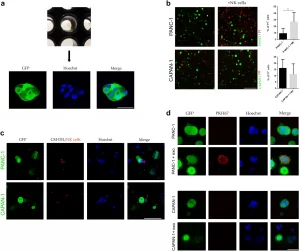Natural killer (NK) cells are cytotoxic lymphoid cells that play a key role in defenses against tumors.
However, their function may be severely impaired in patients with pancreatic adenocarcinoma (PA). Indeed, PA cells release soluble factors, thereby generating an immunosuppressive environment that dysregulates NK-cell cytolytic function and favors tumor immune evasion.
Here, we analyzed the interactions between NK and PA cells using the PANC-1 and CAPAN-1 cell lines derived from a ductal PA and metastatic lesion, respectively. Metastatic and nonmetastatic cell lines were both able to impair NK cytolytic activity.
An analysis of the effect of NK cells and NK-cell-derived exosomes revealed substantial differences between the two cell lines. Thus, NK cells displayed higher cytotoxicity against nonmetastatic PA cells than metastatic PA cells in both 2D cultures and in a 3D extracellular matrix cell system. In addition, NK-derived exosomes could penetrate only PANC-1 spheroids and induce cell killing.
Remarkably, when PANC-1 cells were exposed to NK-derived soluble factors, they displayed substantial changes in the expression of genes involved in epithelial-to-mesenchymal transition (EMT) and acquired resistance to NK-mediated cytolysis. These results, together with their correlation with poor clinical outcomes in PA patients, suggest that the induction of resistance to cytolysis upon exposure to NK-derived soluble factors could reflect the occurrence of EMT in tumor cells.
Our data indicate that a deeper investigation of the interaction between NK cells and tumor cells may be crucial for immunotherapy, possibly improving the outcome of PA treatment by targeting critical steps of NK-tumor cell crosstalk.

3D in vitro cancer models are an important tool to mimic, at least in part, the in vivo tumor structure. 3D PA cultures were generated using alginate hydrogel. Upon growth in alginate spheres, the PA cell lines could generate spheroid structures closer than 2D cultures to the in vivo tumor organization.
In the present study, we provide new information on the interactions occurring between NK cells and pancreatic adenocarcinomas (). In particular, we show that both the PANC-1-cell line derived from ductal PA and the CAPAN-1-cell line derived from a PA metastatic lesion are able to strongly inhibit the antitumor activity of NK cells. On the other hand, NK cells displayed a higher cytotoxicity against nonmetastatic PA cells than metastatic PA cells in both 2D cultures and in a 3D extracellular matrix cell system.
In conclusion, our data show that not only NK cells but also soluble factors and exosomes released by NK cells may affect PA cells. These data could be crucial in optimizing NK-cell-based immunotherapy.
Fiore PF, Di Pace AL, Conti LA, Tumino N, Besi F, Scaglione S, Munari E, Moretta L, Vacca P.
Different effects of NK cells and NK-derived soluble factors on cell lines derived from primary or metastatic pancreatic cancers.
Cancer Immunol Immunother. 2022 Nov 30.
All Resources
Never stop learning!
Check publications from the team, protocols, and useful information to boost your research and get into organ on chip technology!

